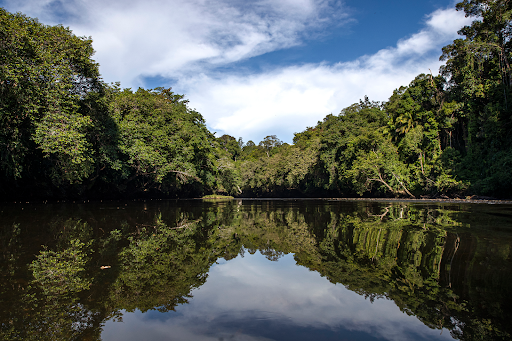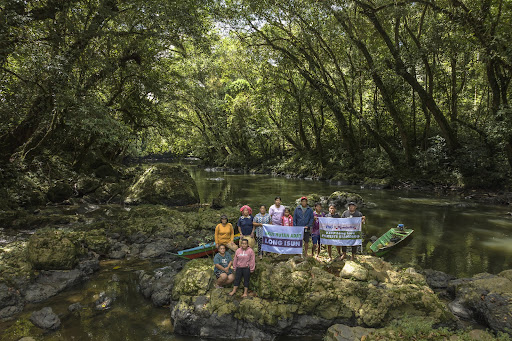Around the world, however, forests continue to fall. Indigenous Peoples and local communities have been successfully managing some of the last intact rainforests for generations, but face constant threats. Indigenous Peoples fight to retain control of their lands from companies looking to encroach with industrial-scale logging and agribusiness.
On the Indonesian island of Borneo, we have a chance to keep forests standing. The rainforests that stretch across the Bornean provinces of North and East Kalimantan are some of the last intact forests in Indonesia, but roughly two-thirds of the remaining rainforest is at risk of industrial development. In the face of mounting threats, an Indigenous community called the Dayak Bahau of Long Isun has been conserving and managing some of these critical forests for generations. The community of Long Isun has fought for over a decade to delay the destruction of their ancestral home, but the fate of their forests still hangs in the balance.
The Harita Group, one of the most influential corporate groups in the palm oil and forestry sectors in Indonesia, controls two timber companies which are planning to log customary forests on over a quarter of the Long Isun community’s land for wood products. Global brands, like snack food and personal care giants Mondelēz and Procter & Gamble, knowingly source palm oil products from mills located in Indonesia that are operated by the Harita Group’s palm oil company.
Borneo is the world’s third-largest island and holds approximately six percent of global biodiversity in its tropical forests, including the distinctive Bornean orangutans, elephants, giant pitcher plants, and the unique Rafflesia flowers. At its center is the “Heart of Borneo”, a large intact landscape of rainforest, rich in biodiversity and covering an area the size of the whole of England and Scotland put together. The Heart of Borneo spans the countries of Brunei Darussalam, Indonesia, and Malaysia, and serves as the home, source of life, and critical source of ecological services for at least 11 million people. These forests, however, are rapidly disappearing. At least 30 percent of Borneo’s tropical forest have been destroyed over the last 40 years.
The Indigenous Dayak Bahau of Long Isun have resided on the banks of the Melaseh river, a tributary of the Mahakam River in the district of Mahakam Ulu, for generations. The Long Isun community has a deep-rooted connection to the forest –– it’s their source of life and the place where they believe their ancestors and the deities that protect them rest. This important connection and respect to land and every living being on their soil is reflected in their customary forest management practices.

The Indigenous territory of Long Isun spans 80,443 hectares––nearly four times the size of the City of Oakland with over 74,000 hectares of customary forests. An estimated 82 percent of their forests are considered undegraded primary forests and 16 percent have been degraded for traditional use such as settlements and community gardens. The Long Isun community has a complex forest management system that includes eleven different customary categories of forest functions, including areas for settlement, production, hunting, medicine, and conservation. For subsistence, the community grows rice paddies, cacao, durian, duku, and other fruits and vegetables. As with other Dayak communities, the Dayak Bahau rotate their crop farms and leave them to reforest, sometimes up to 30 years, using and restoring the forest ecosystem sustainably.
Over the last decade significant areas of forests in East Kalimantan––including customary forests of the indigenous Dayaks––have been allocated by the governments of Indonesia for logging operations and the establishment of pulpwood and palm oil plantations. Between 2009 and 2019 alone, over 487,631 hectares of forests were destroyed within well-known oil palm, and pulp and timber concessions. The Long Isun community was among those who had their land stolen and now belongs to the Harita Group. The Harita Group owns the timber conglomerate Roda Mas, which controls the two timber companies on Long Isun’s territory.
Global brands including Procter & Gamble, Mondelēz, Nestlé, Colgate-Palmolive, Nissin Foods, PepsiCo, and Unilever have disclosed sourcing palm oil from mills that are controlled by the Harita Group. With their significant leverage, these multinational brands have the opportunity to contribute to the protection of intact rainforests and ensure their supplier respects the rights of Indigenous communities across their entire operations, but they need to act and act now.
Despite Long Isun’s long-standing customary rights to their lands and forests, their rights are not legally recognized by the government of Indonesia. This lack of legal recognition is placing their very existence at risk due to the expansion of both industrial-scale logging and palm oil plantations into their territory. The Long Isun community is demanding their forests be legally recognized as customary forest (Hutan Adat title), which grants them ownership and management rights, and for their customary forests to be excised from all forestry and agribusiness concessions.

The Long Isun Indigenous community need our solidarity to demand for the return of their land. We must ask global brands to take action now. Support indigenous communities fighting to keep forests standing.












